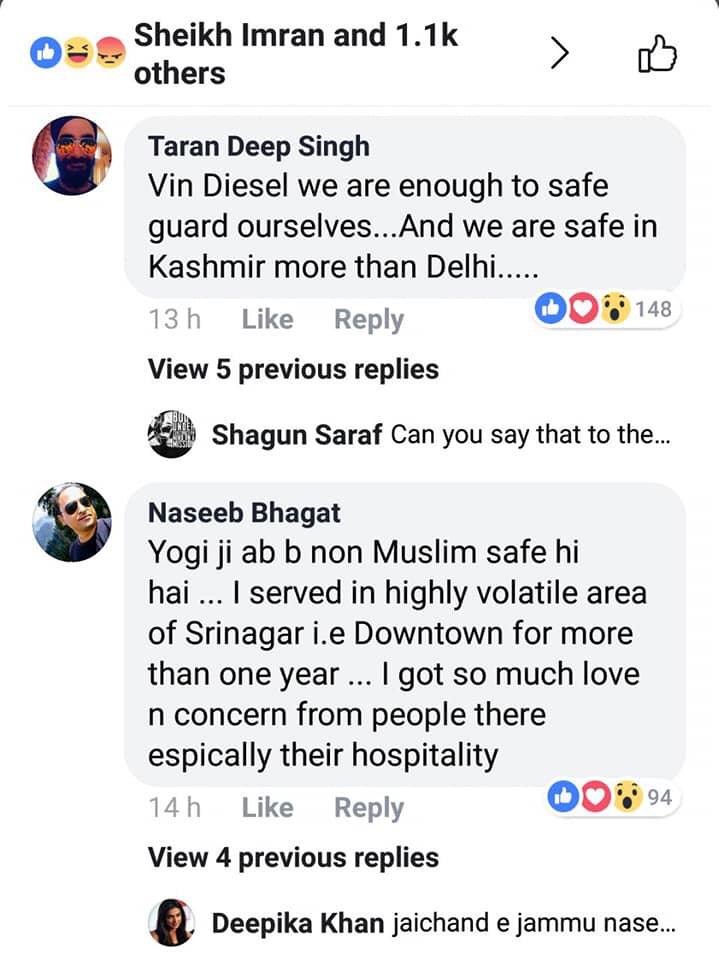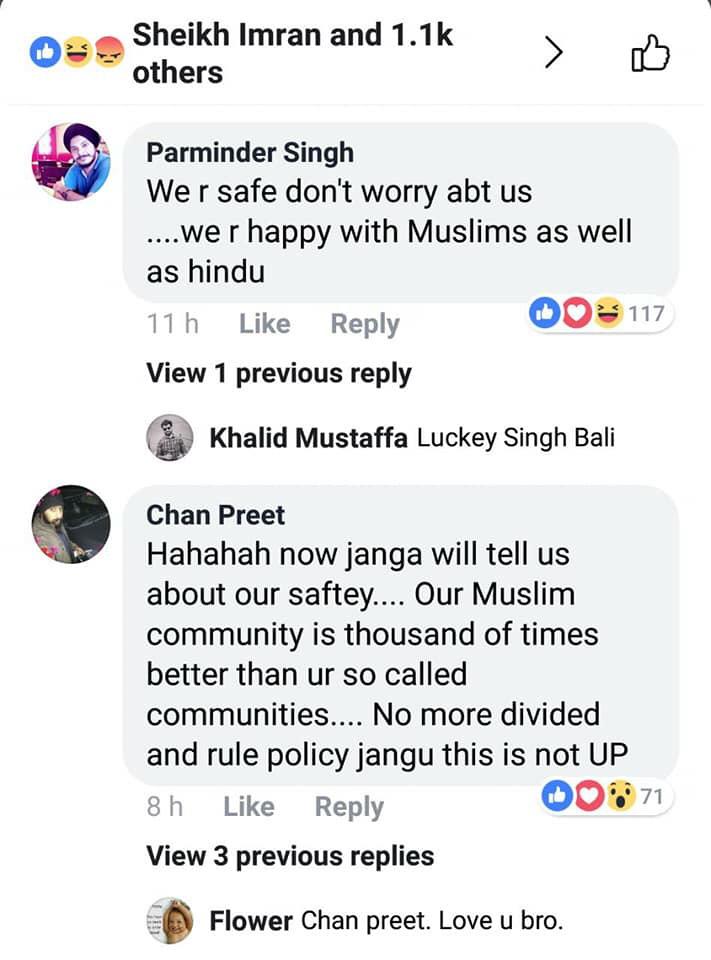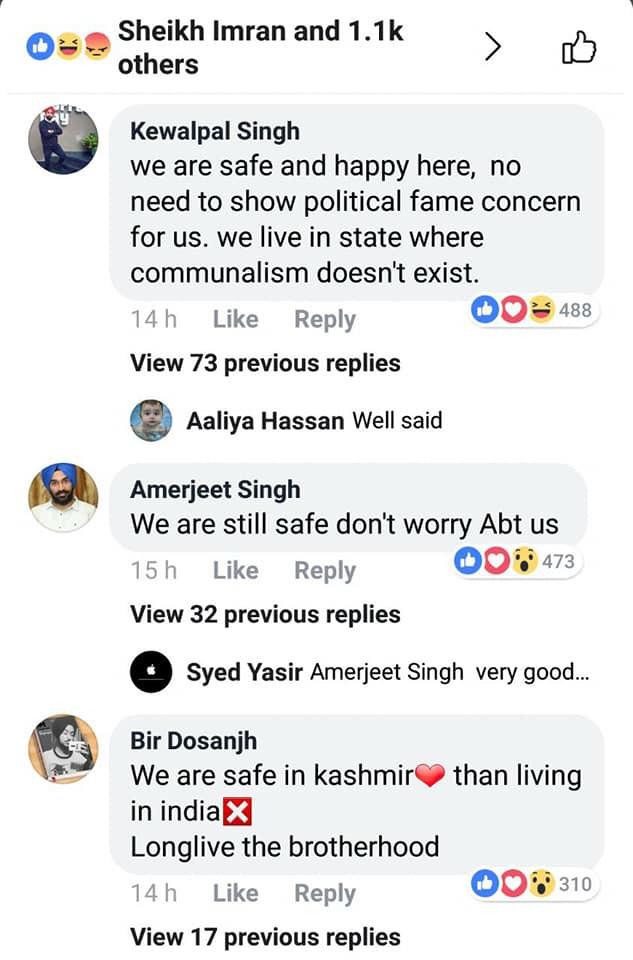Yogi Adityanath’s new ‘polarising’ statement about non-Muslims’ security in Kashmir has drawn a raging flak from Kashmiri Sikh community on social media. While advising Yogi to consult history and fire his fact-checkers, Kashmiri Sikhs asserted that they’re safer and happier in Kashmir than in India’s capital city.
On October 29, when Uttar Pradesh’s controversial chief minister invoked Kashmir’s treacherous past to sing paeans of the Hindu rulers, a Kashmiri Sikh Naseeb Bhagat took a break from his routine and logged on his social media account to counter the “political rant”, which he believed was delivered keeping the 2019 elections in perspective.
Living up to his penchant style, Yogi while speaking in a Sikh Samagam organised by the UP BJP unit in Lucknow remarked: “Hindus and Sikhs were safe in Kashmir only while it was ruled by a Hindu king.”
“Yogi Ji, Ab Bhi non-local Muslim safe hi Hain (The non-local Muslims are still safe),” Bhagat posted on his Facebook wall. “I stayed in highly volatile area of Srinagar i.e., Downtown for more than a year. I got so much love and concern from people there.”
Amid this counter reaction on the virtual world, it seemed as if the monk-turned-head of the state was trying to sound ‘patronizing’ to peddle his polarised politics.
Bhagat’s response soon galvanised into a mass outpouring from the Kashmiri Sikh community—who live in, and know the Kashmir Valley as their home.
That Yogi chose to politicise another public platform to vent his ‘anti-Muslim bile’ became clear the way Kashmiri Sikhs living in Kashmir came together to counter his “tirade and lack of understanding of JK’s tumultuous history”.

But many felt that Yogi was only living by his reputation.
As a cult right-winger, he’s known for targeting Muslims, painting buildings, school buses and bags with saffron colour; renaming cities, building or airports from Muslim to Hindu origin.
The likes of Bhagat not only busted the ‘hate campaign’ stemming from mainland India through political campaigns and media trails, but also restored the faith on the communal harmony with which Kashmiri Muslims and Sikhs have been living for very long time now.
Sikhs on social media were at their creative best over the controversial remarks.
“We are enough to safeguard ourselves and we are safer in Kashmir than in Delhi,” wrote Tara Deep, another Kashmiri Sikh.
Many responded with laughing out loud—LOL—statements.
Supporting Muslims as well as Hindus, Parminder Singh, another Kashmiri Sikh, posted on his Facebook, “We are safe. Don’t worry about us. We are happy with Muslims as well as Hindus.”

Calling it a ‘political fame concern’, another Sikh Kewalpal Singh, wrote, “We are safe here. No need to show political fame concern for us. We live in a state where communalism doesn’t exist.”
Kashmiri Muslims also expressed their disapproval with Yogi’s statements.
Quoting historical incidents when Sikhs were killed in ChattiSingh Pora, Khalid Wazir Khan wrote, “Sikhs are the part of society in Kashmir. Only Pandits were evacuated by Governor Jagmohan with an aim to crush the Kashmiri Muslims. Instead of that (The) Indian agencies killed a huge number of Sikhs in Chatti Singh Pora on arrival of US president in the valley. Later on, the massacre was blamed on the militant groups. But that whole episode comes in public domain after a year.”
Be it Kashmiri Hindus, Muslims, Sikhs or Christians, many say, all suffered in the turmoil—and yet continue to co-exist peacefully.
“Whatever the condition is in Kashmir, we are one,” wrote Bilal Lone, another Kashmiri Muslim. “We have given no space to communalism for 73 years. If we compare Kashmir with other states, I can proudly say we are best in terms of peace. Humanity in Kashmir comes first and religion next.”
The Hindu leader, which Yogi is now invoking, had gone long ago, and we as the minority community are continuously living in Kashmir without any threat perception, said Rupinder Kaur, a Kashmiri Sikh woman, who was born in 90s in Kashmir.
“We never faced any sort of discrimination based on our religion,” Kaur said. “We’re completely safe and happy here.”

It never mattered to us, who ruled us — Hindu or Muslim, said Rajindra Singh, a Kashmiri Sikh trader. “It is the same for us,” he said. “We were never made feel any different from Kashmiri Muslims—just because we happen to practice a different faith.”
Most of my friends are Kashmiri Muslims, another young Kashmiri Sikh shared his “perfect upbringing” in the Muslim majority state.
“In Kashmir, we live like extended families,” said Pradeep Singh, a government employee. “I never felt discrimination for being a Sikh. Infact, my Muslim brethren always made me feel special. No one harassed us for being Sikhs. Never!”
Many of these Kashmiri Sikhs at forefront of countering the “Hindutva propaganda” against Kashmir revealed how the Sikh leaders had called for mass migration of Sikhs from the valley following the Chittisinghpura massacre in which 35 Kashmiri Sikhs were gunned down by some unknown gunners in Islamabad district on 20 March 2000.
“But local Sikhs like us did not agree to that because we felt more safe in Kashmir than in any part of India,” said Rupinder Kaur. “That was again, because our daughters are safer here than in any other place.”
Kaur said that the last rites of Sikhs have time and again being performed by their Muslim neighbours and friends.
“I remember how a Sikh had died in floods,” she said. “Muslims arranged a Chita for his Antim Sanskar. They could’ve buried him. But they chose not to. I think, Yogi just made a stupid statement!”
Like this story? Producing quality journalism costs. Make a Donation & help keep our work going.










